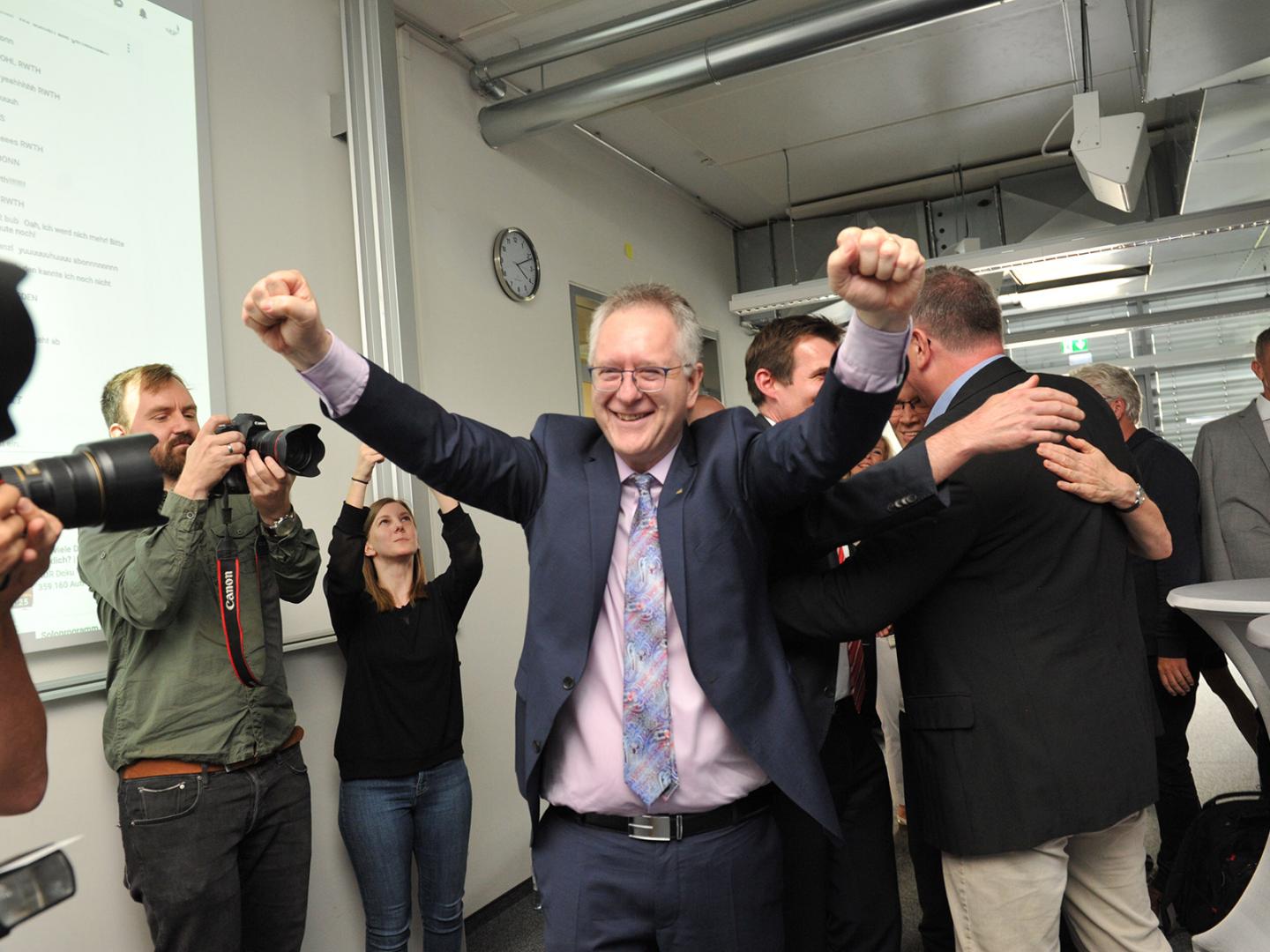
IMAGE: Rector Prof. Dr. Dr. h.c. Michael Hoch celebrates the excellence decision. view more
Credit: Barbara Frommann/Uni Bonn
It is with boundless joy and pride that the University of Bonn has received the decision of the Excellence Commission to grant the Rheinische Friedrich-Wilhelms-Universität Bonn the status of a University of Excellence. It is one of only eleven Universities of Excellence in Germany appointed today and one of two in North Rhine-Westphalia. With the six Clusters of Excellence acquired last September, the University of Bonn is the most successful university in the Germany-wide Excellence competition.
The funding decision was eagerly awaited. At the central lecture hall on campus Poppelsdorf, Rector Prof. Dr. Dr. h.c. Michael Hoch, together with several hundred university members, followed the results announcement press conference via live stream. When the University of Bonn’s name was mentioned, loud cheers filled the hall. “We are a University of Excellence! Today is a milestone in the 200-year history of our university,” said the rector in an initial reaction. “Our efforts have been fruitful and the performance of our university succeeded amongst tough competition. This is a huge success and a big step towards our goal to permanently establish Bonn among the best universities in Germany and Europe.”
“We” as the theme of the application
Professor Hoch thanked all those who made a decisive and united contribution to this success: “‘We’ is the theme of our excellence strategy application. We were successful because we competed together. I wholeheartedly thank all researchers, deans, students, rectorate members and staff for their hard work. My thanks also go to our non-university cooperation partners and the numerous supporters in the city, region and state. This great success shines on the entire international science region that is Bonn and far beyond!”
Already last September, the University of Bonn with its six Clusters of Excellence – spanning its entire scientific spectrum and involving all seven faculties – was the most successful university in the competition. With success in the Universities of Excellence funding line, the University of Bonn has established itself among the most successful research-based universities in Germany. The long-term funding of the Universities of Excellence begins on November 1, 2019, and has a total volume of up to 105 million euros per university for an initial seven years. Thereafter, the Universities of Excellence must undergo external evaluation.
Investing in people, networks and public outreach
At the center of the University of Bonn’s Excellence Strategy is a triad, described in the funding application title: “We invest in people, We foster networks, We create impact”. With financial support from the “ExStra” funding, the university wants to attract new talent on all career stages and continue to optimize working conditions in research and teaching. This will also benefit the university’s six new Transdisciplinary Research Areas (TRAs), which seek to find solutions to major scientific, technological and societal challenges working across disciplines and with the involvement of non-university partners. The university will also use this funding to strengthen and expand its regional, national and international networks. Finally, the university will broaden its involvement in knowledge transfer and science communication to make even better use of the diverse findings from research.
Even in a celebratory mood, the rector keeps a close eye on these ambitious goals: “The status of a ‘University of Excellence’ is both a recognition and an obligation for us. In addition to the curiosity-driven basic research in the disciplines, we also want to promote transdisciplinary cooperation across faculty and subject boundaries and further expand our scientific networks all over the world. Equal opportunities, diversity, sustainability and family-friendly study and working conditions are of central concern to us. We want to also be measured according to this.”
Rector Hoch congratulated RWTH Aachen University on its renewed funding as a University of Excellence. With regret, he noted the decision that the University of Cologne will no longer be funded as a University of Excellence. Rector Hoch said: “The ABC science region (Aachen, Bonn, Cologne including Jülich) is one of the strongest science regions in Germany and Europe. This is reflected in the fact that it is one of the most successful regions in the excellence competition. Our three universities are linked by joint Clusters of Excellence and many other research projects. In any case, this cooperation will be further strengthened and expanded.”
Architect and Motor of Success
The Chairman of the University Council of the University of Bonn, Prof. Dr. Dieter Engels, was one of the first to congratulate and thank Rector Hoch personally for his commitment: “The fact that the University of Bonn can now call itself ‘University of Excellence’ is first and foremost thanks to Michael Hoch. He is the architect and the motor of this success!”
Lord Mayor Ashok Sridharan also personally congratulated the university: “I congratulate the University of Bonn for this great success! The funding commitment as a University of Excellence benefits not only the university, but also the city. The status of University of Excellence enables the university to expand its international position and to better attract international researchers. This will make a significant contribution to strengthening Bonn as an international city and to expanding the science region. The city will support the university in all its activities.”
Note for editors: On the occasion of the funding decision, we invite you to a press conference on Monday, 22 July at 12 noon in the Rectorate, Argelanderstraße 1, 53115 Bonn. Parking is available at Poppelsdorfer Allee 49. You will need a parking pass, which can be obtained from the Division for University Communications.
###
Disclaimer: AAAS and EurekAlert! are not responsible for the accuracy of news releases posted to EurekAlert! by contributing institutions or for the use of any information through the EurekAlert system.

